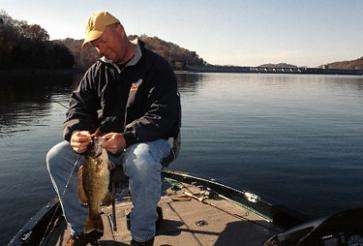
It’s springtime, and in the spring they say a young man’s fancy turns to love. But in the spring, a fisherman’s mind turns to bass — big bass!
There’s simply no better time than the spring to target and catch a giant smallmouth bass — largemouth, too, if you’re so inclined. In fact, if you were to take a look at a list of the biggest smallmouths ever caught, you’d see that most of them were taken in the spring.
Shortly before he died in 2002, my friend Billy Westmoreland put together a little book titled, My 10 Best Ways to Catch a World Record Smallmouth Bass. No one knew more about smallmouth fishing than Billy, and no one caught more really big smallmouth than he did, but I think even he would admit that catching a world record is a pretty tall order.
After all, the record is 11 pounds, 15 ounces and it’s stood the test of time. David Hayes caught that fish from Dale Hollow Lake in 1955. No one’s come within a pound since.
But a lot of the same advice that Billy offered in the little book produced by Horse Creek Resort will help you catch the biggest bass of your life — even if it’s not a world record.
Here are Billy’s tips along with my comments:
1. You need to fish somewhere capable of producing a record bass. That’s true of any sort of fishing or hunting opportunity. If you’re not where the big ones live, you’re not going to catch or kill one. Dale Hollow still tops the list of giant smallmouth waters, but lakes like Pickwick and Erie produce lots of big smallies, too.
2. According to Billy, December through March is the best time for catching a record. I won’t disagree except to point out that April is awfully good, too, and the world record was actually caught on a hot July day. Big smallmouth can strike at almost any time.
3. Billy thought the flats, old roadbeds and humps were key places to look for a record class fish. Points are good, too. To me, one key is deep water. A smallmouth has a better chance of reaching 10-plus pounds by living almost its entire life in deep water — away from hooks and fishermen.
4. When it came to lures, Billy was a big fan of tailspinners and blade baits. I am, too, but I also think a hair jig or even a float-and-fly jig is a likely choice to catch a real giant.
5. Leadhead jigs are great lures if they’re small, according to Billy. I couldn’t agree more, but I think there are times when you can bulk up — especially at night in the summer.
6. Carrying on with his love of leadhead jigs, Billy liked jig heads with small plastic grubs to tempt big smallies. He also liked spinnerbaits on occasion. There’s certainly nothing wrong with either of those baits, but I’m going to put my money on those other baits we covered.
7. Billy believed that deep water was the home of big smallmouth, especially on Dale Hollow Lake. He recommended doing most of your fishing from 18 to 35 feet deep. I agree with him, especially with regard to the deeper end of that range. Smallmouth don’t get big by exposing themselves to lots of lures and fishing pressure like you get in the shallows.
8. Deep diving crankbaits are great big bass lures in cold water. Billy loved the Luhr Jensen Hot Lips Express baits, and so do I. I keep my store well stocked with them and throw them when the water’s cold right on into the spring. If you use really light line (down to 6-pound test), you can get them extra deep.
9. Billy acknowledged that live bait is a potential way to catch a new world record smallmouth. I don’t fish live bait often, but I can tell you that the biggest smallmouth I’ve ever seen on the end of a fishing line was hooked on a minnow that a buddy was drifting around a point. He didn’t catch that fish, but I hope to one day!
10. For whatever reason, there’s no tip under number 10 in Billy’s book. But I want to give you one here, and it’s this: Carry a very big net in the boat with you whenever you’re in waters that might produce a trophy smallmouth. If your buddies give you a hard time about it, just tell them that you’re fishing for a different class of fish than they are.
Until next time, if you have any questions or comments, I’d love to hear from you. Please e-mail me at Stephen@thesmallmouthguru.com.

